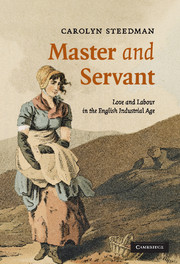Book contents
- Frontmatter
- Contents
- List of maps
- Acknowledgements
- Map 1 Map of the Haworth, Slaithwaite, Huddersfield and Halifax region, 1795
- Map 2 Sketch map of the woollen and worsted producing areas of the West Riding, late eighteenth century
- Prologue
- 1 Introduction: on service and silences
- 2 Wool, worsted and the working class: myths of origin
- 3 Lives and writing
- 4 Labour
- 5 Working for a living
- 6 Teaching
- 7 Relations
- 8 The Gods
- 9 Love
- 10 Nelly's version
- 11 Conclusion: Phoebe in Arcadia
- Bibliography
- Index
11 - Conclusion: Phoebe in Arcadia
Published online by Cambridge University Press: 06 January 2010
- Frontmatter
- Contents
- List of maps
- Acknowledgements
- Map 1 Map of the Haworth, Slaithwaite, Huddersfield and Halifax region, 1795
- Map 2 Sketch map of the woollen and worsted producing areas of the West Riding, late eighteenth century
- Prologue
- 1 Introduction: on service and silences
- 2 Wool, worsted and the working class: myths of origin
- 3 Lives and writing
- 4 Labour
- 5 Working for a living
- 6 Teaching
- 7 Relations
- 8 The Gods
- 9 Love
- 10 Nelly's version
- 11 Conclusion: Phoebe in Arcadia
- Bibliography
- Index
Summary
Arcadian tales are hard-luck stories too.
W. H. Auden, ‘Words’ (1960)In his History of Tom Jones A Foundling, long after the little bastard child has been found on Squire Allworthy's bed, and Henry Fielding has had the servant Deborah Wilkins pause in her enumeration of hussies in the village who may have placed evidence of their shame in the Squire's chamber, to notice that he is not listening to her so rapt is his attention to the baby – long after all of this, the author discusses the relationship between ‘the marvellous’ and the writing of history. (By ‘history’ he meant ‘explanatory narrative’.) Fielding ponders the way in which, were the historian to confine himself ‘to what really happened’ and to reject utterly any circumstance ‘which tho’ never so well attested, he must be well assured is false', then he might well ‘fall into the marvellous, but never into the incredible’. He might raise ‘the wonder and surprise of his reader, but never the incredulous hatred mentioned by Horace’. Horace has been important in Fielding's leading up to this point, for he had taken pains to urge writers (historians) not to introduce supernatural agents into their accounts. Had his advice been followed, observed Fielding, then we should not, for example, have seen Homer's gods and goddesses ‘coming on trivial errands … behaving themselves so as not only to forfeit all title to respect, but to become objects of scorn and derision’.
- Type
- Chapter
- Information
- Master and ServantLove and Labour in the English Industrial Age, pp. 217 - 230Publisher: Cambridge University PressPrint publication year: 2007

